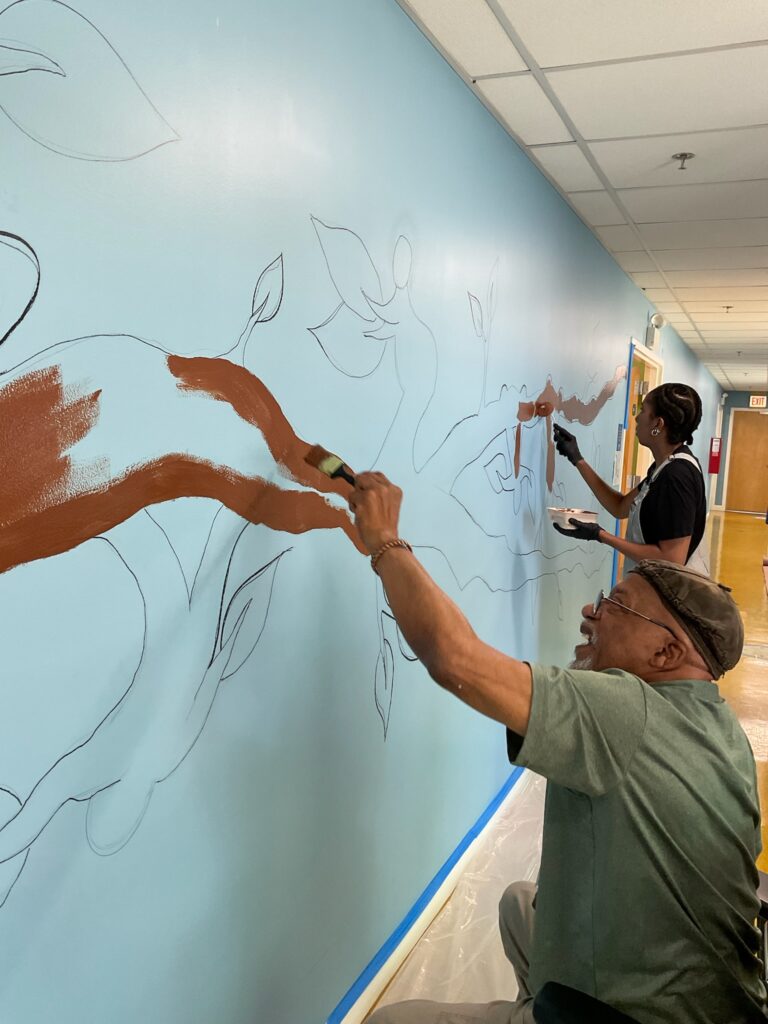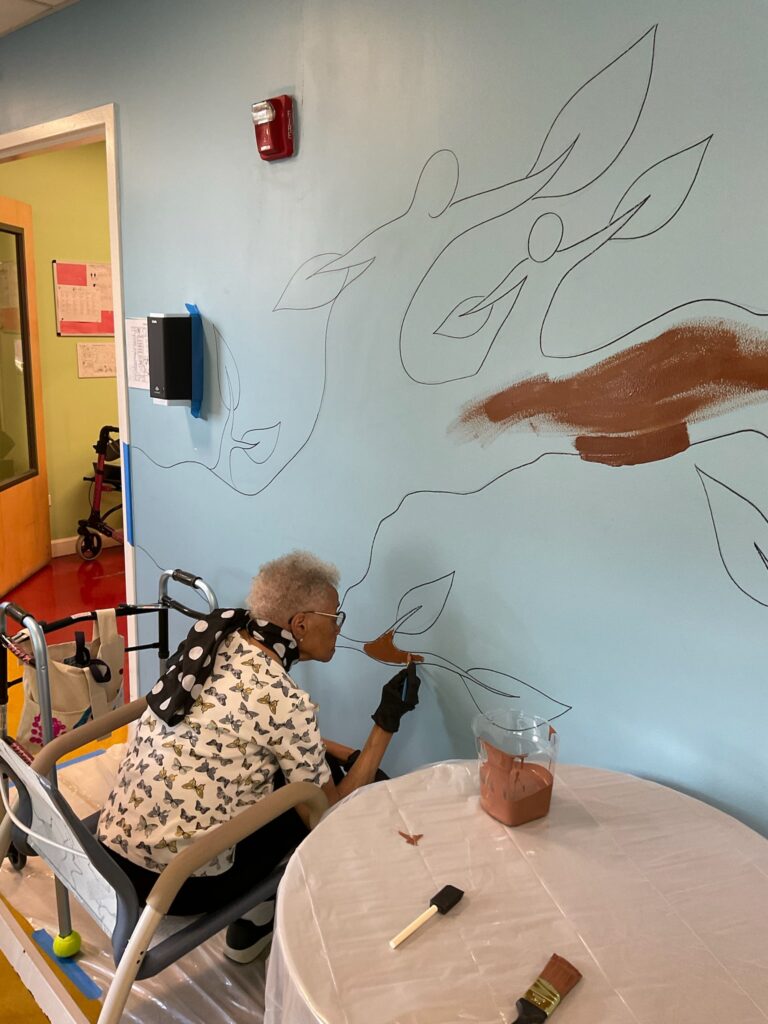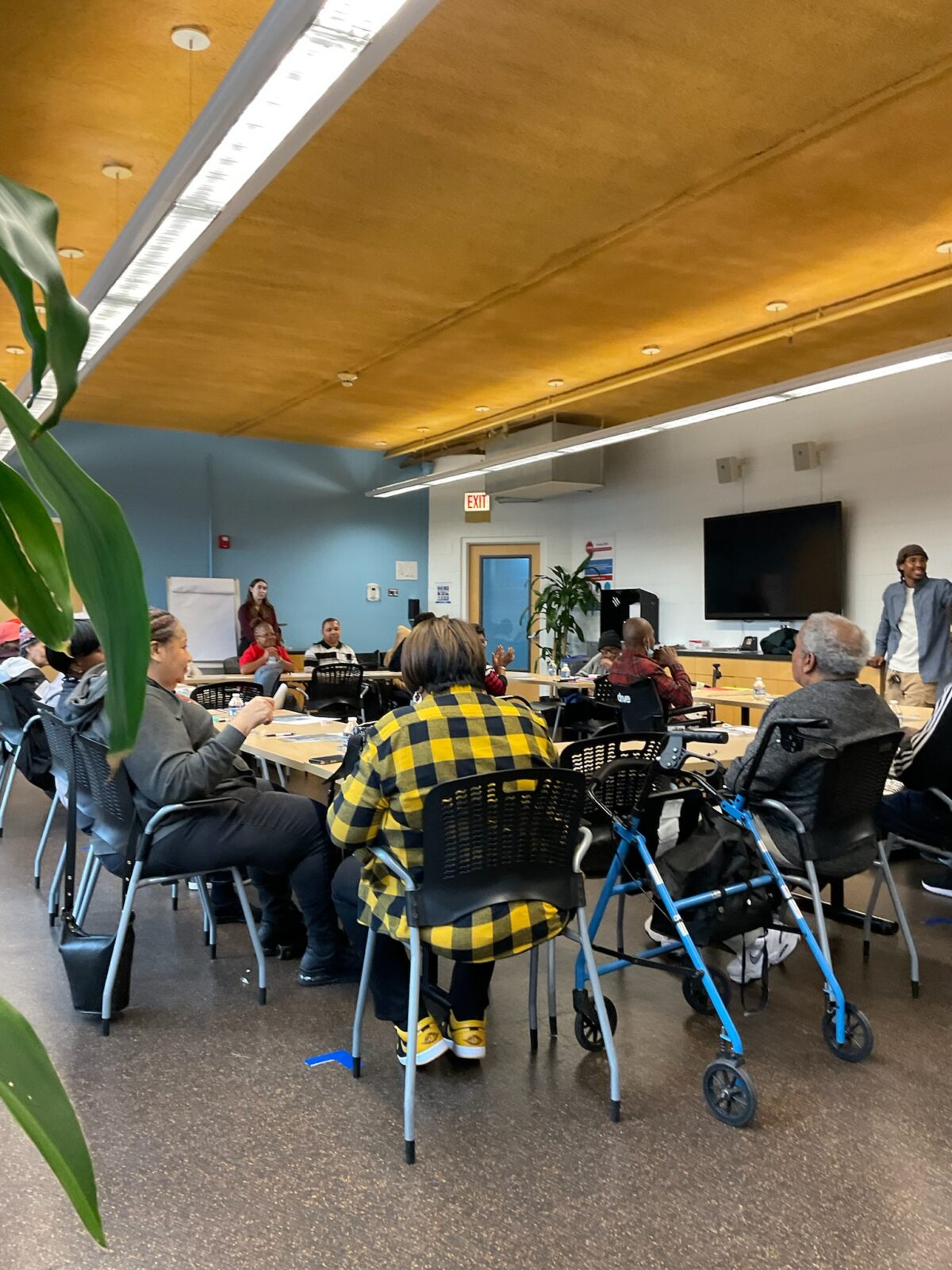I think I’ve been coming here for about seven years. I love it. I don’t miss a day,” said Shirley Boykin, eighty-two, and one of the older adults served through Chicago Commons, a non-profit providing early childhood education, career services, and senior care to families living on the South and West Sides.
Boykin, who also goes by the nickname PK, loves to travel and is quick to tell you all about the adventures of her younger years driving up and down the California coast. Nowadays, she has settled down in Bronzeville, but Boykin still likes to keep busy. Lately, that means attending Chicago Commons programming. Since March the organization has been providing artistic outlets to seniors and adults with disabilities as a part of their Adult Day Services at 515 E. 50th St. in Bronzeville, one of the organization’s five locations.
“There’s just always something to do. It’s never, never a dull moment…We are often doing something, we go to the zoo, we go to the museum, musical festivals, we do it all,” she said.
Boykin participates in the organization’s Adult Day Services (ADS), which provides professional care and community engagement opportunities to seniors and adults with disabilities. The goal is to engage this demographic with their local community through the arts. With the help of a Healing Illinois grant from the Illinois Department of Human Services, Chicago Commons has begun expanding its ADS to include arts programming led by local South Side artists.
The expansion is the result of tireless efforts by Chicago Commons’ Training and Content Coordinator and South Sider Taylor Thompson, who wanted to find a way to blend her interest in the local artist community with her work at Chicago Commons.
One stipulation of the Healing Illinois grant is that its funds go toward helping communities process the trauma of racialized violence. To organize this kind of programming at Chicago Commons, Thompson began chatting with other folks in the area that were centering racial healing through the arts. She connected with Monica Haslip who helms the community art center Little Black Pearl in North Kenwood. Haslip also helps run the Truth, Racial Healing & Transformation process through the W.K. Kellogg Foundation, that uses creative projects to address the systemic and personal effects of racism.
Haslip gave Thompson some crucial advice: if folks are enjoying themselves and having a good time, that is the most important thing. “Monica told me, ‘If you have a positive experience, doing any kind of art, you’re more likely to return to it and engage with that deeper,’” said Thompson. “That definitely gave me the confidence that I needed to run with this project.”
Chicago Commons’ arts programming began in March with a visit from Hyde Park poet Justus Cornelius Pugh who led a writing exercise and poetry recitation for ADS participants. Other local artists have included singer songwriter Xochi Onohan who did a Mother’s Day performance for the group. Onahan sang a love song she had written to get her through a difficult time—her father had recently become paralyzed—and the ADS participants joined in. It felt like “medicine for the soul,” said Thomspon.


At their most recent event, a group of around a hundred seniors and adults with disabilities packed the Chicago Commons activity room to listen to the song stylings of singer Jenipher Jones and pianist Morgan E of the band The Jenipher Jones Experiment. Morgan and Jones channeled the kind of music they say their own grandparents would want to hear, Motown classics like The Temptations and The Jackson 5. In the middle of their set one of the program’s seniors burst into song, perfectly on key.
“It was great to see them smile,” said E. “I really feel like music can jog certain memories. It can be someone who has not said anything in a long time, and if you play a certain song, next thing you know, they’re singing with it, or they’re moving or something. It’s good to look over and see them enjoying it like, ‘Oh yeah, that’s my song!’”
Program participant Janice, who attended Jenipher and E’s performance, said that events like this one have helped her feel more connected to her community. Janice found out about the program through her doctor, who said it may help alleviate her Alzheimer’s symptoms. She has also been struggling with depression brought on by feelings of loneliness. “When you come down here in the morning, if you’re feeling down, it lifts you up,” said Janice. “I’m among senior citizens and we all have problems, but we all help each other.” She has particularly enjoyed drawing pictures, some of which she has gifted to her daughter.
The ADS group has also participated in arts-centric field trips made possible by funding from the Healing Illinois grant. The group recently visited the Bronzeville arts center Fourtune House where program participants had a photo shoot using colorful fabrics borrowed from The Sarah Kuenyefu Collection, an artisan boutique next door. Thompson also passed around disposable cameras for participants to snap photos of one another. These photos, alongside other art from program participants, will be a part of an exhibition Thompson is planning for the fall.
Chicago Commons will wrap their summer arts programming by collaborating with artist and local teacher Delia West on a mural for the organization’s activity room. West will be creating the design and the ADS participants will be helping paint the final piece. Thompson sees the mural as an opportunity for folks to leave their mark on a beloved community space.
Alongside providing a space for seniors and adults with disabilities to get creative, Thompson also sees Chicago Common’s arts programming as a way to engage the local community and provide people doing creative work with more opportunities to get paid. During their Fourtune House trip, many of the seniors, some of whom have lived in Bronzeville or adjacent neighborhoods for years, didn’t know that an art center existed just around the corner.
For Thompson, this partnership between South Side area artists and older adults touches on a question she thinks about often: How do we get resources to those who need them in our communities most effectively?
“Programs sometimes replicate services within the community and we might have ten people doing the same thing or one person doing one thing that everybody really needs,” said Thompson. “As opposed to immediately typing into Google, like ‘photographers around me,’ how do we sustain neighborhoods? How do we grow businesses? How do we create sustainable income in professions, like for artists? It’s about establishing that network and maintaining that sense of community.”
Charlie Kolodziej is a freelance journalist whose work has appeared in South Side Weekly, Windy City Times, and The Chicago Reader.

